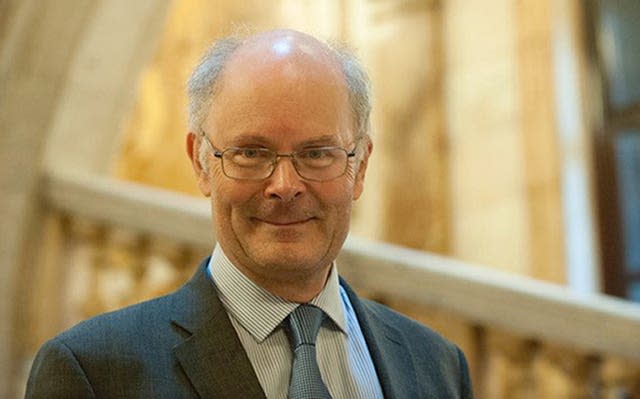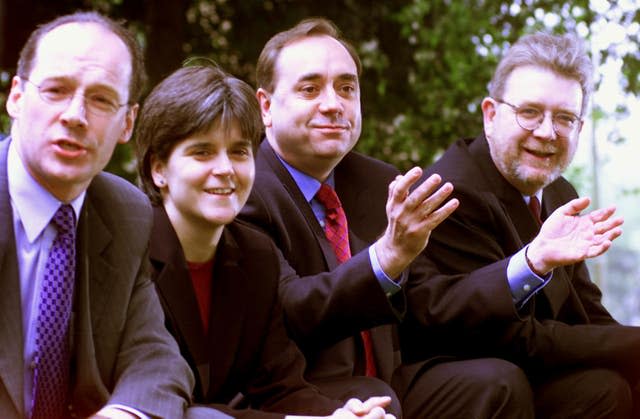SNP the electoral winner of devolution, says polling expert
The SNP has been the electoral winner of devolution, polling expert Professor Sir John Curtice said on the 25th anniversary of the first Scottish Parliament election.
In 1999, the country went to the polls for the first time to elect a crop of MSPs for the freshly-formed Parliament, returning Labour as the largest party.
Donald Dewar-led Labour made a deal with the Liberal Democrats to govern as a coalition for the first eight years of Holyrood’s existence – despite changes at the top of both parties.
But by 2007, the mood in the country had changed and the SNP was elected as the largest party – winning just one seat more than Labour.

That minority administration led eventually to the majority of 2011 – due to a poor Labour campaign and perceived competence of the SNP in government, Sir John said – and the Edinburgh Agreement, paving the way for the 2014 referendum and ushering in an era of SNP dominance in Scottish politics at every level.
Speaking to the PA news agency, Sir John said that from an opinion poll in 1998, it appeared voters were more likely to back the SNP in Scotland than at Westminster.
“It was already the case that, (if you) ask people the Scottish question as opposed to a UK-wide question, they appeared to be more inclined to say ‘it’s the SNP’,” he said.
“We also discovered that the SNP had this very clear reputation for standing up for Scotland’s interests.”
The creation of Holyrood meant the SNP had a “substantial body of full-time parliamentarians for the first time”, and it was able to bring north already-seasoned politicians who had sat at Westminster – including Alex Salmond and John Swinney.
Labour, on the other hand, opted to bring in more inexperienced parliamentarians.

Sir John said: “It was an unusually talented SNP generation… and they were joined by people like (Nicola) Sturgeon and (former minister Mike) Russell, and they became elected parliamentarians.”
The SNP government in 2007 not only represented a change in the colour of the largest party, but also in its willingness to air its disagreements with Westminster in public.
“There was this very strong wish inside the Labour Party to keep disputes private,” he said.
“Labour’s offer was there will be a nice, lovely relationship between Edinburgh and London.
“The SNP offer was ‘we’ll stand up for the people of Scotland’.
“I think the SNP read devolution in the minds of the public much more accurately than Labour, and that’s a mistake Labour is still at risk of making even now.”
The 2011 campaign for Scottish Labour, Sir John said, was “disastrous”, and was “symbolised” by then leader Iain Gray being hounded by campaigners in Glasgow city centre and forced to seek refuge in a Subway sandwich shop.
Sir John said: “Opinion clearly shifted (from Labour to the SNP) – you could feel it shifting in the last week, 10 days and the SNP got an overall majority.
“That was not what was supposed to happen.”
The additional member election system used at Holyrood is designed in such a way as to make a majority extremely difficult to gain.
Sir John added: “The SNP reputation in 2011 was ‘these guys have done alright, it’s not too bad, they seem to know what they’re doing’.”
He said voters were also swayed by the talent within the SNP ranks compared to that of Labour, which had been thinned by the loss of Mr Dewar, who died in 2001, and others.
The polling guru concluded that one of the goals of devolution, as was expounded by Lord Robertson before the Parliament was created, was to “kill nationalism stone dead”.
He added: “After 25 years, we’ve had 17 years of SNP Government, we’ve had a referendum – the result of which was higher levels of support for independence than there ever was beforehand – and now in the wake of Brexit support for independence is even higher.
“This country is just divided down the middle on it.
“This was not the devolution project. Although at the moment you can look at it and say the SNP is heading for trouble and the possibility of another independence referendum is a million miles away – and all that’s true – looking back on 25 years, if you told the SNP 25 years ago they would be worrying about losing 20 seats at Westminster, they’d bite your arm off.”
